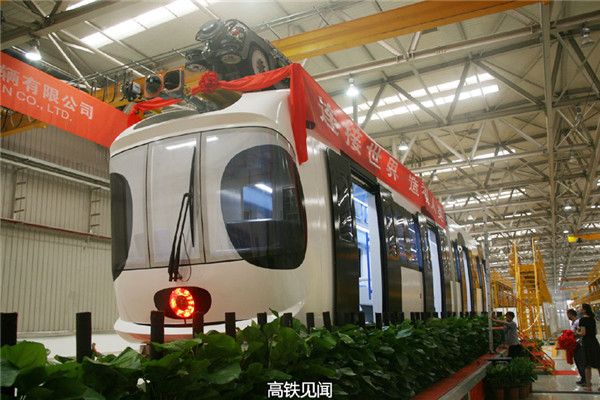Page 10875
Sep 11, 2016
Cybathlon: World’s first ‘bionic Olympics’ gears up
Posted by Karen Hurst in categories: cyborgs, robotics/AI, transhumanism
Awesome.
Competitors prepare for a contest involving electronic arms and robotic exoskeletons.
Interesting read.
The Asian superpower is boosting basic research funding in its 13th five-year plan—a boon for this list of scientists and the wider R&D community.
Sep 11, 2016
China’s first sky train off assembly line
Posted by Karen Hurst in category: transportation
All aboard the Sky Train.
China’s first sky trains came off the assembly line in the city of Nanjing on Saturday, with China becoming the third country to master sky train technology, after Germany and Japan.
The Nanjing Puzhen Company Limited, affiliated to China’s largest State-owned rolling stock manufacturer CRRC Corporation Limited (China Railway Rolling Stock Corporation), took only four months to design and complete the elevated railway trains, said CRRC.
Continue reading “China’s first sky train off assembly line” »
Sep 11, 2016
Largest global innovation conference to kick off in Russia
Posted by Karen Hurst in categories: business, economics
Moscow, Sep 11 (IANS) The announcement of the Russia-US ceasefire deal for Syria, paving the way for new negotiations on the latter’s future, comes ahead of a major global conference here next week under the auspices of the International Association of Science Parks and Areas of Innovation (IASP).
The Spain-headquartered IASP is the largest worldwide network of science parks and areas of innovation, uniting technology parks, business incubators and institutions, and it has a Special Consultative Status with the United Nations Economic and Social Council (ECOSOC).
Its mandate is to contribute to global economic development through innovation, entrepreneurship, and the transfer of knowledge and technology.
Continue reading “Largest global innovation conference to kick off in Russia” »
Sep 11, 2016
US Air Force advances rocket technology
Posted by Karen Hurst in categories: energy, military, satellites
The United States is one step closer to eliminating its reliance on Russian technology to launch its military satellites.
The Hydrocarbon Boost Technology Demonstrator, a U.S. Air Force technology effort focused on development of Oxygen Rich Staged Combustion rocket engine technology, has recently completed its first full-scale component test at 100-percent power.
The development of Oxygen Rich Staged Combustion technology has been deemed a critical technology for the nation to help eliminate the United States’ reliance on foreign rocket propulsion technology.
F-35 with Lasers.
Absolutely” put laser guns on its f-35s.
As if the F-35 wasn’t enough of a technological marvel already, now the military wants to stick laser guns on it. But who will build them?
Sep 11, 2016
Will Quantum Computers Transform The Next Century?
Posted by Karen Hurst in categories: computing, particle physics, quantum physics
Hmmmm; I suggest that “Kate” needs to follow up with the research teams at the University of Sydney, MIT, ORNL, and University of China who have already proven and shared insights and techniques to stabilize QC, make it scalable (as we are already seeing Google leverage), and trace particles throughout entanglement. I really do not like ready articles that misleads the public because the author was lazy in not doing their own research and homework on their topics.
Today I’d like to speak about quantum computers and to share my ideas of their purpose in the nearest future. As you know, applying the laws of quantum mechanics it’s actually possible to create a new type of computing machine, enabling to solve some of the issues, being currently unable to resolve even upon the use of the most powerful machines. As a result, the speed of major complex computations will significantly increase, for instance, the messages sent via quantum coupling lines will be impossible to capture or to copy. Sounds quite fantastic, isn’t it? Furthermore, today we already have working prototypes of future quantum computers. So, let’s consider this topic more precisely.

Continue reading “Will Quantum Computers Transform The Next Century?” »
Synthetic human lung cells possibly the best method for new drug testing.
Scientists are putting human cells through micro-obstacle courses designed to replicate the mechanics inside our bodies and better test drug effectiveness.
Sep 11, 2016
The 21st Century Is a Wild Time to Be Alive
Posted by Klaus Baldauf in category: singularity
Last week in San Francisco, Singularity University hosted its first-ever Global Summit. In three days, we heard over 100 science and technology experts give talks in more categories than one human mind can fully process.
Whether you attended the conference and need help making sense of the information or missed it and want a taste of the action, I’ve collected Singularity Hub articles on some of the major themes to give you takeaways from the event.
If you’re curious for a look inside the conference, you can watch:
Continue reading “The 21st Century Is a Wild Time to Be Alive” »

















